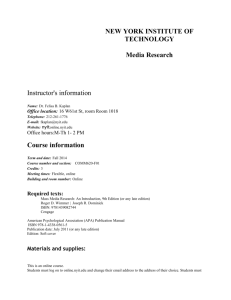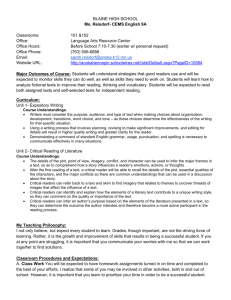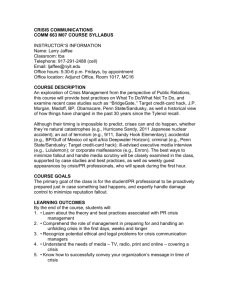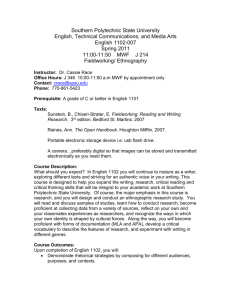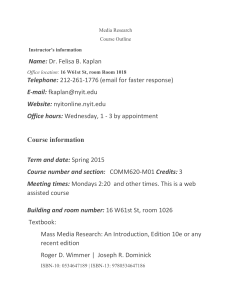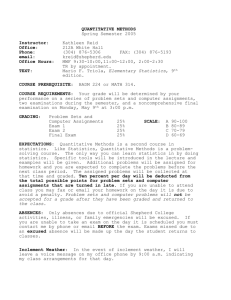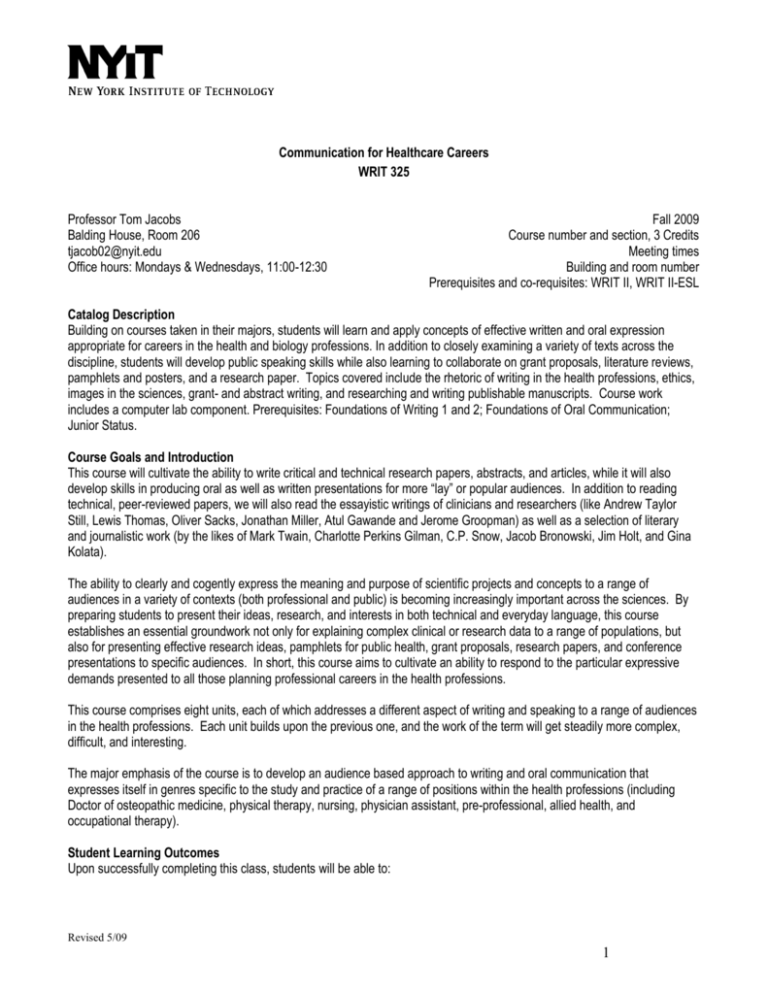
Communication for Healthcare Careers
WRIT 325
Professor Tom Jacobs
Balding House, Room 206
tjacob02@nyit.edu
Office hours: Mondays & Wednesdays, 11:00-12:30
Fall 2009
Course number and section, 3 Credits
Meeting times
Building and room number
Prerequisites and co-requisites: WRIT II, WRIT II-ESL
Catalog Description
Building on courses taken in their majors, students will learn and apply concepts of effective written and oral expression
appropriate for careers in the health and biology professions. In addition to closely examining a variety of texts across the
discipline, students will develop public speaking skills while also learning to collaborate on grant proposals, literature reviews,
pamphlets and posters, and a research paper. Topics covered include the rhetoric of writing in the health professions, ethics,
images in the sciences, grant- and abstract writing, and researching and writing publishable manuscripts. Course work
includes a computer lab component. Prerequisites: Foundations of Writing 1 and 2; Foundations of Oral Communication;
Junior Status.
Course Goals and Introduction
This course will cultivate the ability to write critical and technical research papers, abstracts, and articles, while it will also
develop skills in producing oral as well as written presentations for more “lay” or popular audiences. In addition to reading
technical, peer-reviewed papers, we will also read the essayistic writings of clinicians and researchers (like Andrew Taylor
Still, Lewis Thomas, Oliver Sacks, Jonathan Miller, Atul Gawande and Jerome Groopman) as well as a selection of literary
and journalistic work (by the likes of Mark Twain, Charlotte Perkins Gilman, C.P. Snow, Jacob Bronowski, Jim Holt, and Gina
Kolata).
The ability to clearly and cogently express the meaning and purpose of scientific projects and concepts to a range of
audiences in a variety of contexts (both professional and public) is becoming increasingly important across the sciences. By
preparing students to present their ideas, research, and interests in both technical and everyday language, this course
establishes an essential groundwork not only for explaining complex clinical or research data to a range of populations, but
also for presenting effective research ideas, pamphlets for public health, grant proposals, research papers, and conference
presentations to specific audiences. In short, this course aims to cultivate an ability to respond to the particular expressive
demands presented to all those planning professional careers in the health professions.
This course comprises eight units, each of which addresses a different aspect of writing and speaking to a range of audiences
in the health professions. Each unit builds upon the previous one, and the work of the term will get steadily more complex,
difficult, and interesting.
The major emphasis of the course is to develop an audience based approach to writing and oral communication that
expresses itself in genres specific to the study and practice of a range of positions within the health professions (including
Doctor of osteopathic medicine, physical therapy, nursing, physician assistant, pre-professional, allied health, and
occupational therapy).
Student Learning Outcomes
Upon successfully completing this class, students will be able to:
Revised 5/09
1
Analyze a specific audience in terms of role(s), priorities, background, culture, and values, and create
communications that inform or analyze, or both.
Identify the essential elements of typical professional forms of communication, and incorporate those elements in
their own communications.
Identify sources, evaluate their credibility, and incorporate and document them appropriately to advance the
persuasive and/or informative purposes of their writing.
Understand and put into context a variety of different types of texts by applying enhanced critical thinking and
analytical skills.
Produce writing that follows professional conventions in grammar, mechanics, and style, with emphasis on clarity and
conciseness.
Develop a better understanding of the creative processes involved in developing poster and powerpoint
presentations, research papers, and the act of writing itself.
Use effective principles of design in creating documents and visual aids.
Work effectively in teams on complex projects that result in written, oral, and visual communication.
Employ an effective writing process to produce professional-quality communications that draw upon a broader,
interdisciplinary mindset.
Apply ethical principles of written and oral communications to typical workplace situations.
Outcomes particular to Writing for the Healthcare Professions: For this particular professional communication course,
students will also learn to:
distinguish between colloquial and professional discourse.
distinguish between different kinds of audience.
distinguish between objective and evidentiary subjective documentation.
write an abstract.
create and edit a power-point presentation.
deliver an oral presentation of the major project.
write a literature review addressing a particular problem or question.
edit and format a major report.
write a professional-level research paper for submission to a peer-reviewed journal.
write collaborative research papers with researchers and/or clinicians.
write an annotated bibliography.
Use APA in-text and bibliographic citation (and have a familiarity with other styles, as well, like CSE).
Methods of Assessment/Overview of Assignments
Much of your success in this course will depend upon your keeping up with all the assigned readings, which will be text
chapters, papers from peer-reviewed journals, professional essays written for the general audience, student sample
assignments, etc. It is crucial that you are prepared to discuss the readings and your own assigned work in class. There will
be frequent opportunities for informal presentation on reading/writing topics throughout the semester. Written work completed
outside of class will build logically. If I need to give quizzes on readings, they will be unannounced and may not be made
up/receive credit, if you are late or absent (unless you present a verifiable, original copy of a documented medical excuse
immediately upon your arrival/return to class or provide written notice of a religious holiday before the holiday).
Revised 5/09
2
Class participation is a vital part of your experience in this course and therefore a significant part of your grade. Good
participants prepare for class, attend class consistently, arrive on time, stay on task during class, and contribute productively
and enthusiastically to class activities and discussions. Think of our class as a professional community, an organization, or a
company. We work best as a team, pooling our resources and learning much more through mutual feedback and discussion.
We need everyone’s commitment to the team. This is the ideal you will find in the professional world.
Written assignments are due promptly when class begins on the due date indicated on the syllabus. Prepare them
completelyprinting, stapling, inserting page numbers, etc.—before class. An extension (to a specific new due date) may be
granted in extreme circumstances, but only if you ask for and are granted the extension before the original due date. Late
assignments will be lowered 7 points (out of 100) per class day late and will not be accepted more than 2 weeks late. The
final assignment in the course will not be accepted late. Major writing assignments also include an in-class peer review
workshop on drafts. Missing a draft workshop also will lower your paper 7 points.
Neatly word-process writing assignments, using standard margins and spacing and format appropriate to the type of
document. At work, even a single error in spelling, grammar, or proofreading can jeopardize the effectiveness of some
communications. My grading will reflect the great seriousness with which these matters are viewed in the working world.
Proofread carefully.
Always maintain at least 2 electronic back-up copies of all work so that you don’t lose anything and avoid having to start your
assignment over from scratch.
Grading Formula
When grading your assignments, I will ask one overriding question: "Does this communication work successfully?" That is,
would your communication have the intended effect on your specified audience? A competent performance (a "C") is one that
stands a reasonable chance of succeeding; an excellent performance (an "A") is one that seems assured not only of success
but also of winning praise. Assessment criteria include the following:
understanding of writing as a process
purpose and focus are clear
work is well-organized and there is a clear sense of development
student shows ability to analyze information and to interpret/evaluate evidence
student shows awareness of audience
voice and tone are appropriate to the task
The grade breakdown is as follows:
successful work in each unit will show:
Sample excerpts (Unit One) ..................... 5%
ability to distinguish between different types of discourse and audience
Powerpoint Presentation (Unit Two)....... 10%
effective use of design principles, understanding audience
Visual Presentation (Unit Three) ............ 10%
effective us of design, understanding of creative process
Response Paper (Unit Four) .................. 10%
grasp of professional conventions; critical thinking/analytical skills
Abstract (Unit Five) ................................ 10%
effective teamwork; ability to understand and condense range of texts
Literature Review (Unit Six)...................... 5%
ability to identify, evaluate, and incorporate sources
Paper Proposal (Unit Seven).................. 10%
understanding of creative process
Final Research Paper (Unit Eight).......... 20%
interdisciplinary skills, understanding of professional conventions
Revised 5/09
3
Participation ........................................... 10%
Final Exam ............................................. 10%
Attendance, Timely Arrival, Materials, and Other Policies
Attend class faithfully; missing more than 4 times is grounds for withdrawal from the course or automatic failure. At the
very least, excessive absences and/or late arrivals will significantly lower a student’s grade. However, absences for
medical reasons, with presentation of a verifiable, original copy of a medical doctor’s note immediately upon the student’s
return to class, and absences for religious holidays, with written notification of the holiday before the absence, do not
count against the limit of 4 absences; only these will be considered “excused” absences.
Arrive on time; 2 times late = one absence.
If you must miss a class, you are responsible for finding out what you missed and catching up; contact me or consult a
classmate.
Turn off and keep out of sight (in your backpack, purse, or pocket—not out on the desk) all cell phones/beepers/ipods/radios/headphones/similar devices in my classroom.
Lab computers are only for class assignments during class time; they may not be used for web surfing, email, or any
other purpose.
Bring a USB/storage device containing all of your course work to every lab session (save all of your work on a second,
back-up device too).
Remember that we meet in the computer lab one day a week and in the regular classroom one day a week; make sure
that you show up in the right place.
If you must bring food or drink into the classroom, always clean up after yourself, disposing of trash and recyclables in the
appropriate receptacles. No refreshments are permitted in the computer lab room.
Do not leave the classroom during class, unless you have a genuine emergency; in such a rare case, make every effort to
speak with me before leaving.
When there is reading due from the text, bring the textbook to class; on days when we discuss sample assignments, bring
hard copies of the relevant samples to class.
Bring only materials/objects appropriate for class work.
Disruptive behavior is unacceptable.
Course Text
Heifferon, B. A. (2005) Writing in the Health Professions. New York : Pearson-Longman
It is recommended that you purchase the 5th edition of Publication manual of the American Psychological Association.
Date
9/8-9/17
Assignment
Unit One
The basics of reading and writing like a health professional
In this unit, we will begin by reading a variety of types of works across a range of disciplines
(including health professionals, essayists, short-story writers, and politicians). These works will
include essays, short stories, case reports, literature reviews, public health pamphlets and
brochures, and peer-reviewed clinical and basic science research. After examining the rhetoric
and structure of each of these texts (i.e., what makes each of these texts distinctive), your task
will be to write sample excerpts of each type of text to demonstrate your understanding of the
range of rhetorical strategies used in the health professions.
Revised 5/09
4
9/22-9/30
10/1-10/8
10/1310/20
10/2210/29
11/311/10
11/1211/19
Read: Handouts given in class
Unit Two
Understanding audience
This unit will build upon the previous unit by cultivating your ability to write and speak “like a
health professional” to a range of different audiences—the general public, your peers, health
insurance company adjustors, and the management/administration of a hospital or clinic. After
exploring how the vocabularies, needs, and expectations of each of these audiences differ, you
will give a 10 minute powerpoint presentation to one of the above audiences from a list of topics
to be assigned.
Read: “Audience Analysis and Context Analysis” and “Document Design Principles and Data
Management”
Unit Three
Studying the role of images in the sciences
In this unit, you will examine the centrality of images to the discourse of the health professions
(and of science more generally). After examining how images are effectively deployed across a
range of genres, your task will be to design a brochure/pamphlet/poster presentation
addressing a basic but important health concern using both text and images to convey your
idea.
Read: “Presenting Written Materials Visually”
Unit Four
Ethics in the health professions
In this unit, we will explore the ethical conflicts and complexities of health care, reading a range
of works that examine how the forces of advertising, big pharma, and the complexities of the
health care system raise difficult problems every health care provider must face. This unit will
end in your writing a 4 page response paper responding to a specific ethical problem.
Read: “Ethics in Medical Writing”
Unit Five
Collaborating on a problem and developing a proposal
In this unit, your task will be to develop, in collaboration with two of your peers, an outline for a
grant proposal (based on the NIH’s standard format) for a project of your devising. Your job is
basically to ask for money for a worthy project; in order to do this, you will have to
collaboratively research the topic, and then write an abstract and present a preliminary budget
for an idea that might help/work/have an effect.
Read: “Grants and Proposals, and Government and Insurance Documents”
Unit Six
Review of the literature
In this unit, you will learn how to define and frame a topic, research it, and then produce a 3-4
page summary of what you’ve found with a concluding statement on your own sense of the
future of the field.
Unit Seven
Defining and researching a topic for a formal research paper
In this unit, you will develop a paper proposal, write an abstract, an outline, and an annotated
bibliography for a topic of particular interest to you. Something like “cerebral palsy” or “H1N1
Revised 5/09
5
influenza” will not be enough. You will need to refine your frame and perform enough research
to become something of an authority on a specific area of health care: e.g., you will need to
know the etiology of a disease or problem and what current therapies are used so that you can
provide a comprehensive overview and proposal for future directions.
11/1912/8
Read: Appendix A: “Review of Process Writing”
Unit Eight
The research paper
In this unit, you will write a 10-12 page research paper that will grow out of the previous unit. In
addition to the paper itself, you will need to incorporate relevant images, write an abstract, and
a cover letter to a publisher who might be interested in your paper. You will also need to follow
the “instructions for authors” for your targeted journal.
Withdrawal policy
A student may withdraw from a course without penalty through the end of the 8th week of class during a 14- or 15-week
semester and through the 8th meeting during an 8week course cycle. After this, the student must be doing passing work in
order to receive a W grade. Students who are not passing after the 8th week or equivalent will be assigned the grade of WF.
It is the student’s responsibility to inform the instructor of his/her intention to withdraw from a course. If a student has stopped
attending class without completing all assignments and/or examinations, failing grades for the missing work may be factored
into the final grade calculation and the instructor for the course may assign the grade of WF. The grade of F is used for
students who have completed the course but whose quality of work is below the standard for passing.
Withdrawal forms are available in departmental offices and once completed must be filed
with the registrar. Students should be reminded that a W notation could negatively impact
their eligibility for financial aid and/or V.A. benefits, as it may change the student’s
enrollment status (full-time, part-time, less than part-time). International students may
also jeopardize their visa status if they fail to maintain full-time status.
Academic integrity and plagiarism policies
Each student enrolled in a course at NYIT agrees that, by taking such course, he or she consents to the submission of all
required papers for textual similarity review to any commercial service engaged by NYIT to detect plagiarism. Each student
also agrees that all papers submitted to any such service may be included as source documents in the service’s database,
solely for the purpose of detecting plagiarism of such papers.
Plagiarism is the appropriation of all or part of someone else’s works (such as but not limited to writing, coding, programs,
images, etc.) and offering it as one’s own. Cheating is using false pretenses, tricks, devices, artifices or deception to obtain
credit on an examination or in a college course. If a faculty member determines that a student has committed academic
dishonesty by plagiarism, cheating or in any other manner, the faculty has the academic right to 1) fail the student for the
paper, assignment, project and/or exam, and/or 2) fail the student for the course and/or 3) bring the student up on disciplinary
charges, pursuant to Article VI, Academic Conduct Proceedings, of the Student Code of Conduct.
Library Resources
Revised 5/09
6
All students can access the NYIT virtual library from both on and off campus at www.nyit.edu/library. The same login you use
to access NYIT e-mail and NYITConnect will also give you access to the library’s resources from off campus.
On the left side of the library’s home page, you will find the “Library Catalog” and the “Find Journals” sections. In the middle
of the home page you will find “Research Guides;” select “Video Tutorials” to find information on using the library’s resources
and doing research.
Should you have any questions, please look under “Library Services” to submit a web-based “Ask-A-Librarian” form.
Support for students with disabilities
NYIT adheres to the requirements of the Americans with Disabilities Act of 1990 and the rehabilitation Act of 1973, Section
504. The Office of Disability Services actively supports students in the pursuit of their academic and career goals.
Identification of oneself as an individual with disability is voluntary and confidential. Students wishing to receive
accommodations, referrals and other services are encouraged to contact the Office of Disability Services as early in the
semester as possible although requests can be made throughout the academic year.
Revised 5/09
7



